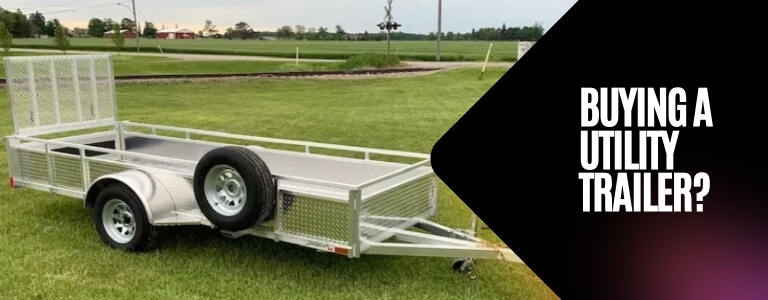
October 28, 2021 Last updated on June 16, 2023 by Bob Fisher Bob Fisher Landscape Trailers
For professionals, homeowners, weekend warriors, and others, landscape utility trailers can be an extremely useful piece of equipment. However, there are many different types of trailers, and you have to find the kind that suits your purpose for it to be of any use to you. Here are some things to consider before you buy so you can make a smart purchase of a trailer that will continue to serve you well for many years.
How frequently do you intend to use your trailer? What type of cargo do you intend to haul? Are you only going to use your trailer to haul one type of cargo, or will you put it to multiple purposes? These are all things you need to consider before making the purchase because they all have some bearing on what type of trailer you should buy. You need to make sure that the trailer is large enough to accommodate your cargo, whatever it may be, but avoid buying one that is too large or you may end up doing extra maintenance. Another important consideration is whether the payload capacity of the trailer is sufficient to bear the weight of your intended cargo.
Despite its many potential uses, a utility trailer won’t do you any good at all if your vehicle lacks the ability to tow it when fully loaded. You have to factor in both the weight of the cargo and the weight of the trailer itself. The owner’s manual for your vehicle should give you the maximum towing weight that it can handle. You then need to find out the weight of the trailer and subtract it from the maximum towing weight to determine the size of the cargo that you can carry at one time. As long as the combined weight of the trailer and the cargo is less than the maximum towing weight for your vehicle, you should be able to haul the load. Attempting to tow more than your vehicle is built to handle could damage its engine.
While some types of trailers have walls and ceilings, landscape utility trailers are open to the air. They are different than flat decks in that they may have solid sides to help contain your cargo, but these are low. They may also have railings along the sides. You can secure your equipment with the help of D-rings or slats. Camping gear, lawnmowers, and garden or landscaping equipment are all examples of the types of cargo you can haul with your utility trailer.
However, not all utility trailers are identical. The biggest variation may be in the number of axles they have. A single axle trailer has two wheels, one on either side. A tandem axle trailer has four wheels. However, unlike the wheels of a car that are spaced out, with two in the front and two in the back, the wheels of a tandem-axle trailer are placed very closely together. To disperse the weight of the cargo, they are at the center of the trailer rather than at either end. This increases the trailer’s maneuverability and helps to absorb shock.
If you intend to haul heavy loads, a tandem-axle trailer is better able to handle them. However, if you only intend to haul everyday household items or small business-related cargo, a single-axle trailer offers its own unique advantages. It is lightweight and easier to maneuver than a tandem-axle trailer.
We manufacture many different types of trailers, including landscape utility trailers. If you have unique needs that standard models cannot accommodate, we can create one that is custom-made and has all the features you need. Learn more about our landscape utility trailers or contact us with questions about customization.